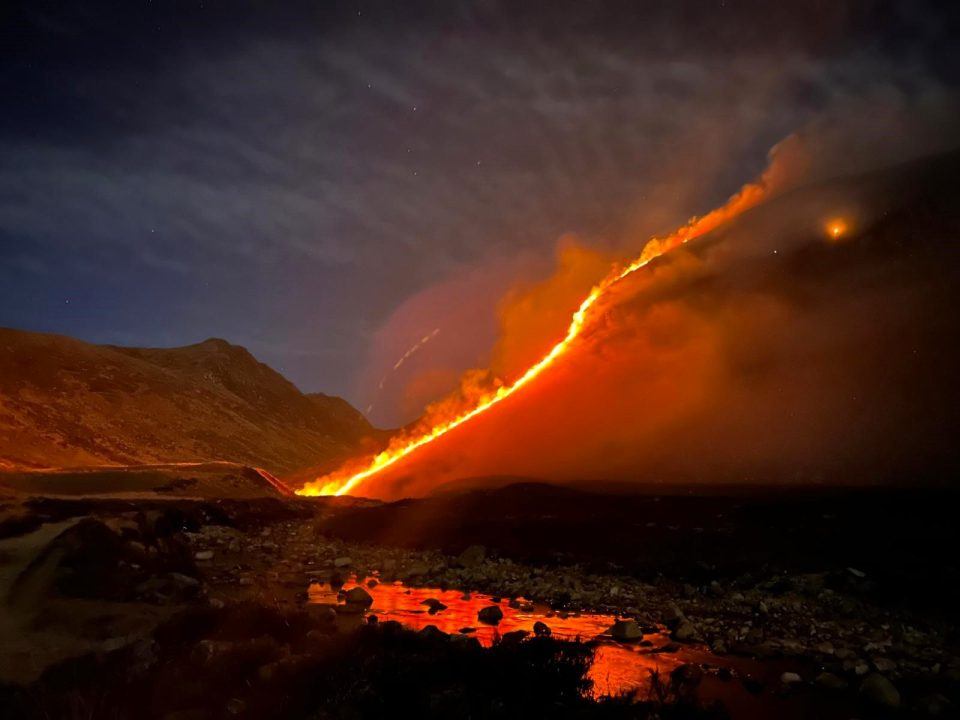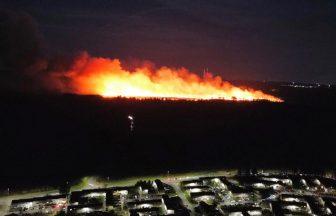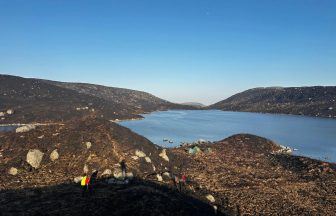The spate of fires gripping Scotland’s nature reserves and countryside could be “disastrous” for wild animals, according to the Scottish Wildlife Trust.
Fire services have been battling multiple blazes across the country over the past week, including one at Galloway Forest Park, near Glentrool in Dumfries and Galloway, last Thursday.
The blaze burned for at least four days and at its height, there were two fire engines at the scene, assisted by two helicopters dousing the area with water.
A group of campers, comprising of two fathers and their sons, were rescued by the Coastguard and airlifted to safety amid the chaos.
Firefighters were also called to reports of a wildfire off Fannyside Road in Cumbernauld on Thursday night and remain on the scene of a blaze near Brodick on the Isle of Arran.
The Scottish Fire and Rescue Service issued an “extreme risk” alert across the whole of Scotland from Friday, April 11, until Saturday, April 12.
Concerns have since been raised regarding the “threat” the fires pose to the country’s nature reserves and rural land.
Ruchir Shah from the Scottish Wildlife Trust said the blazes are potentially destroying already “threatened habitats such as woodlands and wetlands”, which is “disastrous” for wildlife.
The director of external affairs said: “It is particularly worrying to see so many fires at this time of year, as many species will be preparing and maintaining nesting sites in order to breed raise their young.
“We would encourage anyone visiting our reserves or other areas in the countryside to be extra careful during this dry spell. Please do not build campfires or discard flammable materials that could worsen the situation.
“You can get the latest advice on enjoying our reserves responsibly and preventing wildfires from the Scottish Fire and Rescue Service’s website: https://www.firescotland.gov.uk/news/extreme-wildfire-warning-in-place-from-friday-11-april/ and by making sure you follow the Scottish Outdoor Access Code.”
Michael Humphreys, the national wildfire lead for the Scottish Fire and Rescue Service (SFRS), pleaded with the public to act responsibly as the warning covering Friday and Saturday came into effect.
Mr Humphreys said while some might think it unusual to have wildfires at this time of year, SFRS data for the last decade shows “we see the largest number of wildfires between the months of March and June every year”.
He said he hopes the extreme wildfire warning will “make people think if they are going out to enjoy the countryside, to act responsibly, and stop a fire from starting in the first place”.
The firefighter told BBC Radio Scotland’s Good Morning Scotland programme: “What we see is the majority of fires, it is human behaviour that starts the fire in the first place.”
He urged people heading out to the countryside to think about the risks, adding: “Enjoy the countryside, it is a sunny day today, but act responsibly.
“If you normally use a barbecue maybe think about taking a picnic instead or using a designated area.
“Take all your litter home, glass can reflect and start a fire and if you do smoke just make sure your cigarette is absolutely fully out.”
He added that wet weather last year meant there had not been as many wildfires in 2024, but there have been a “number” of blazes this week and he highlighted the “devastation they can cause to the countryside and the worry for local residents”.
His comments came after a week which has seen fire crews battle wildfires in places including Skye and the Galloway Forest Park – where four campers had to be rescued by helicopter as the flames spread.
Mr Humphreys urged anyone who spots a fire to call the fire service immediately.
Follow STV News on WhatsApp
Scan the QR code on your mobile device for all the latest news from around the country


 Police Scotland
Police Scotland



























